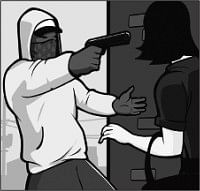Your advocate
This week your advocate is Barrister Omar Khan Joy of the Supreme Court of Bangladesh and Head of 'The Legal Counsel'. His professional interests include commercial law, corporate law, family law, land law, constitutional law, banking law, arbitration and intellectual property laws. Our civil and criminal law experts from reputed law chambers will provide the legal summary advice.
 Reader's query
Reader's query
Last week, my friend and I were robbed at Banani 11 by 6 goons in their early twenties. We had just come out of the ATM booth and we lost 20,000 Tk in cash along with mobile sets. They came in a silver car, carried weapons and snatched our belongings. I went to the local police station the next day and they kept insisting I file the case under theft. After two hours of arguing with the police I gave up. My friend and I lost quite a great deal of money and I just can't seem to be able to do anything about it. Please define and identify the difference between theft and robbery and I would also like to know the penalty given for the offences. Also advise on what one should ideally do in these situations.
P. Sharif, Banani
Response
I would like to thank you very much for asking me to provide legal Opinion regarding offences related to Theft and Robbery. The incident described by you is not very uncommon in our country, especially in Dhaka city. Such incidents significantly increase during the holidays.
Theft has been defined in section 378 of the Penal Code 1860. Accordingly, a person commits theft when he dishonestly intends to take any movable property out of the possession of its owner and without his consent. The offender has to move the property in order to take it.
On the other hand, Robbery is defined in section 390 of the 1860 Code. In Robbery there is either Theft or Extortion. Theft amounts to Robbery, when the offender voluntarily causes or attempts to cause death or hurt or wrongful restraint or fear of instant death, hurt or of wrongful restraint. It must be caused in order to commit or in committing theft or in carrying away or attempting to carrying away property obtained by Theft.
As far as the difference between the two offences is concerned, it appears that Theft is the taking away of movable property out of the owner's possession without causing or attempting to cause death or hurt or wrongful restraint or fear of instant death, hurt or of wrongful restraint unlike Robbery.
Penalty for Theft is contained in sections 379 and 382 of the Penal Code. Section 379 renders Theft punishable with imprisonment of either description (i.e. Simple or Rigorous) which may extend to three years or with fine or with both. On the other hand Section 382, renders Theft punishable with rigorous imprisonment for a term which may extend to ten years, and the offender shall also be liable to fine when theft involves preparation for causing death, hurt or restraint. As the goons carried weapons, this section is likely to be appropriate.
Punishment for Robbery is contained in section 392 of the Penal Code. It provides for rigorous imprisonment for a term which may extend to ten years and the offender shall also be liable to fine.
You may also bring an action for Dacoity which is defined in section 391 of the Penal Code. Dacoity involves the commission of Robbery by five or more persons conjointly. As you mentioned, there were six goons, thus Dacoity is also relevant here. Section 395 of the Penal Code contains penalty for Dacoity which is rigorous imprisonment for a term which may extend to ten years, and the offender shall also be liable to fine. Besides, Section 397 of the Penal Code provides for punishment due to Robbery or Dacoity with attempt to cause death or grievous hurt with imprisonment of not less than seven years.
In these situations, one should go to the Police Station immediately after the incident. If possible the victim should look for petrol teams of the law enforcers located nearby. If possible, lawyers may accompany the victim in the police station to address legal issues, if any complexity arises. As far as the circumstances are concerned, the victim should try to remember the registration number of the vehicle used for such offences along with other information leading to identification of the offenders.
I hope that the aforesaid analysis shall help you to find an appropriate solution to your queries. Stay safe and remain safe.
For detailed query contact [email protected].